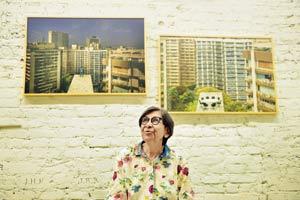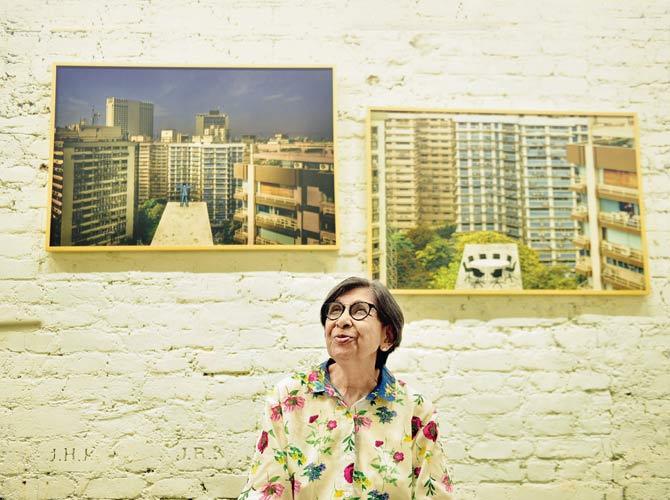In her upcoming solo exhibition, veteran artist Meera Devidayal turns to an age-old battle between humans and nature, as it plays out in the ever-expanding megacity, Mumbai


Meera Devidayal with two works titled At The Edge, to be shown at her upcoming solo exhibition, Water Has Memory. Pic/Bipin Kokate
There's chance that you may turn into an island, with your back against one wall, as you watch Meera Devidayal's Water Has Memory. We are in an inner room at Chemould Prescott Road, the Fort-based art gallery, where the three-channel video-work is projected around us. To our left is a seascape, its glimmering silence cut by the roar of a fishing boat. To our right is an angrier avatar of the sea, crashing and clanging, framed by high-rises, possibly those at Nariman Point. But, there, right in front of us, is a segment that could occupy the heart of this story. It's a hive of windowpanes, fitted with grubby AC units and rusting grills. Here, little trace of the natural world is evident, but the sea has managed to sneak in. On these windows, waves and boats are reflected, and we are able to sense the seascape, but such as we would a mirage. The real sea still eludes us.
ADVERTISEMENT
"I found that very intriguing," says Devidayal, 71. As a veteran among India's contemporary artists, whose mixed media works and part-celebratory-part-elegiac affair with Mumbai is only too well-known, Devidayal's upcoming solo exhibition has the once-bustling seat of commerce and MNC prowess, Nariman Point, as its canvas. "You cannot see the sea at Nariman Point - there are just office buildings and windows. And, every window had a different reflection of the sea. It was a surreal sight and that was my starting point," she tells us when we meet her at the gallery last week. Water Has Memory lends itself as the title of the exhibition, and evokes the moment that Devidayal recalls. "It struck me that much of this area is reclaimed, and we think we have conquered the sea, but the sea is asserting its presence. It is as if it is telling us, 'You think I am not there, but I am'," she adds.
Devidayal has been acutely observant of the megapolis's many transformations over the decades. Her last solo, A Terrible Beauty, held in 2014, was a paean to the fading relics of Mumbai's industrial era - the textile mills - and seemed to suggest the potential for the rejuvenation of the defunct spaces in alternative ways that didn't uphold malls and corporate offices. Previously, in 2009, another solo, Where I Live, made the karkhana workers and labourers of Dharavi its protagonists. Here, Devidayal invoked the city as a "dream-world", into which "hapless migrants from across the country get lured into its neon-lit web of seemingly limitless opportunity - without seeing its swampy underbelly. Though the 'WELCOME' shining gold from afar turns to rusty iron as they draw near, they manage to survive the ever-present hostility of the cityscape, by living the waking dream of success, in a city filled with promises," she wrote for that exhibition. Cut to 2018, and one wonders if the city has grown too big for its boots. Hopeful dreams are now a disillusionment with Maya Nagari.
"I call Mumbai home; it has been so for the last 50 years, since I came here after I got married. Mumbai doesn't terrify me; I am terrified of what we are doing to it," continues Devidayal, as she walks us through her works. The exhibition, set to open on April 16, comprises mixed media works, drawings, and two video works. Among them, is a mixed media painting titled Chipping Away the Ocean, where the quintessential blue tarp of Mumbai wrestles with the sea over canvas space. What will eventually win? The sea or the tarp?
Devidayal's show incidentally comes at a time when we have been bracing ourselves for more sea invasion in the form of the 29.2 km-long Coastal Road. But, lest we forget, there are those people whose survival depends on the construction of the city - such as Chipping Away the Ocean, in which labourers do their balancing act on scaffolding - and through whom Devidayal signals the endless breaking-down-and-building-up of Mumbai.
In her works, a comment on Mumbai's socio-economic and class realities is never far away, but she herself admits that Water Has Memory is lesser so than the solos that preceded it. "These [migrant workers and labourers] are the people I interact with and talk to. They are very much a part of my life. It may seem like I am sitting on a pedestal and talking about them - it's true that I am not one of them, but I do empathise with them," she says.
In some works, such as The Serene Brutality of the Ocean, the sea does not brim with a vengeance but instead offers solace and safe passage. However, history continues to play villain, raising old ghosts, and making it hard for the city to effectively bury its past. Concrete may try hard to replace water, but, as Devidayal seems to warn us, in our quest for 'more, more, more' we are but treading on slippery ground.
Catch up on all the latest Mumbai news, crime news, current affairs, and also a complete guide on Mumbai from food to things to do and events across the city here. Also download the new mid-day Android and iOS apps to get latest updates
 Subscribe today by clicking the link and stay updated with the latest news!" Click here!
Subscribe today by clicking the link and stay updated with the latest news!" Click here!







